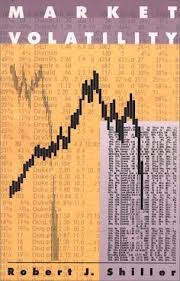Market volatility
- ISBN: 9780262691512
- Editorial: The MIT Press
- Fecha de la edición: 1992
- Lugar de la edición: Cambridge (MSS). Estados Unidos de Norteamérica
- Encuadernación: Rústica
- Medidas: 23 cm
- Nº Pág.: 461
- Idiomas: Inglés

Servicio de búsqueda de libros
Este libro está agotado o descatalogado por la editorial. Si lo desea podemos buscar esta obra en librerías de saldo y ocasión.
Sí, por favor búsquenme este libroMarket Volatility proposes an innovative theory, backed by substantial statistical evidence, on the causes of price fluctuations in speculative markets. It challenges the standard efficient markets model for explaining asset prices by emphasizing the significant role that popular opinion or psychology can play in price volatility.Why does the stock market crash from time to time? Why does real estate go in and out of booms? Why do long term borrowing rates suddenly make surprising shifts? Market Volatility represents a culmination of Shiller's research on these questions over the last dozen years. It contains reprints of major papers with new interpretive material for those unfamiliar with the issues, new papers, new surveys of relevant literature, responses to critics, data sets, and reframing of basic conclusions. Includes is work authored jointly with John Y. Campbell, Karl E. Case, Sanford J. Grossman, and Jeremy J. Siegel.Market Volatility sets out basic issues relevant to all markets in which prices make movements for speculative reasons and offers detailed analyses of the stock market, the bond market, and the real estate market. It pursues the relations of these speculative prices and extends the analysis of speculative markets to macroeconomic activity in general.In studies of the October 1987 stock market crash and boom and post-boom housing markets, Market Volatility reports on research directly aimed at collecting information about popular models and interpreting the consequences of belief in those models. Shiller asserts that popular models cause people to react incorrectly to economic data and believes that changing popular models themselves contribute significantly to price movements bearing no relation to fundamental shocks.Robert J. Shiller is Stanley B. Resor Professor of Economics at the Cowles Foundation, Yale University.










